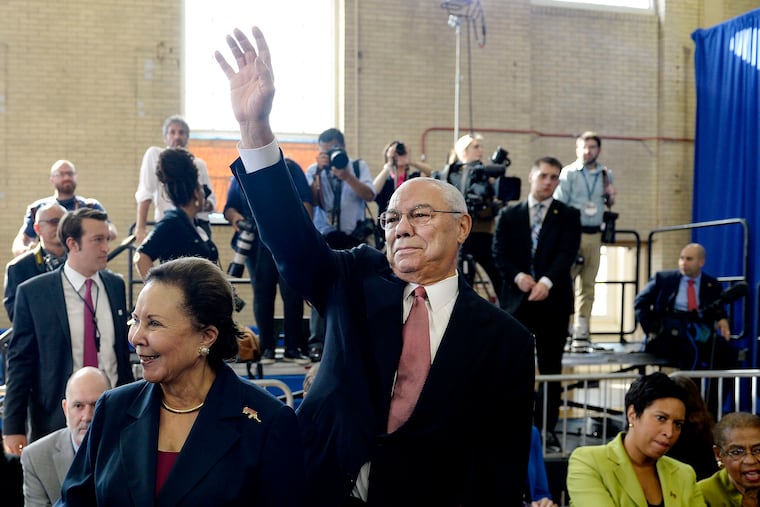Colin Powell should be remembered for promoting honesty, civility, and patriotism above divisive politics | Trudy Rubin
A retired general, national security adviser, and former secretary of state, Powell served presidents of both parties with distinction but left the GOP over Trump's lies.

As soon as I learned that former Secretary of State Colin Powell had died Monday, my mind flashed back to his infamous U.N. speech on Feb. 5, 2003, in which Powell pressed for a war to disarm Iraq. I can’t forget my unease as I watched him — on TV in northern Iraq, where I was awaiting the start of the Iraq War.
I was stunned. It was already widely known that Saddam Hussein had no nuclear weapons — despite Bush administration claims. Rumors were rife that defectors were feeding fake information to U.S. sources about bioweapons. Moreover, it was clear on the ground in Iraq that U.S. troops would face a broken nation on the brink of ethnic and religious civil war, even if the invasion went well.
Powell himself presciently tried to warn President George W. Bush in 2002 that an invasion would saddle the United States with huge Iraq burdens, coining what became known as the Pottery Barn rule: “If you break it, you own it.”
Still, despite his skepticism, this soldier-statesman somehow was conned by bad intelligence briefs and inserted them into a U.N. address that he later admitted would “blot” his record forever. Indeed, that speech figures prominently in all the obituaries about Powell’s passing from COVID-19 complications (amidst a battle against cancer that had weakened his system against both the disease and the vaccine).
Yet, that blot, although hard to ignore, shouldn’t overshadow the greatness of the man.
» READ MORE: ‘I didn’t know men like him existed’: Colin Powell’s legacy with Philly youth | Opinion
Colin Powell symbolized the values this country once respected and a kind of moderate Republican that has virtually gone the way of the dodo. He supported leaders of both parties, depending on who he thought would do the best job, and who he thought might bring the country together.
So what Powell will be remembered for goes far beyond his professional achievements. It can be summed up in a word: character.
Of course, his character underlay his achievements, which were enormous, and deserve listing. Born in New York City to Jamaican immigrants, he rose to become the youngest and first Black chairman of the Joint Chiefs of Staff. He oversaw the first, successful Iraq War in 1991 and laid out the Powell Doctrine, calling for applying military might only with overwhelming and decisive troop strength.
He served as national security adviser under President Ronald Reagan and became the first Black person to serve as secretary of state under President George W. Bush. Although he had long considered himself a Republican, he endorsed Barack Obama, praising “the inclusive nature of his campaign.”
Indeed, it was that search for inclusivity and worry about increasing incivility in politics that was a hallmark of his political outlook dating from the 1990s, when he considered, then ruled out, running for president. He said he lacked “a calling.” Perhaps he understood how ugly partisan politics was already becoming.
Powell stood on principle in criticizing the growing divisiveness and ugly political culture that was taking hold of the Republican Party. He finally abandoned his effort to “help the party of Lincoln move once again close to the spirit of Lincoln” when the GOP became the party of Donald Trump. He rightly labeled Trump a liar.
After the Jan. 6 insurrection at the U.S. Capitol, Powell said he no longer considered himself a member of Trump’s GOP. “We need people that will speak the truth,” he said.
So it’s not surprising that, as deeply felt tributes pour in from Powell’s close associates, many come from those who lean to the left and left-center of the political spectrum. A small sample of the praise:
“Wonderful human being,” Gen. Wesley Clark said on Monday.
“Character, competence, integrity” was the praise offered by Col. Bill Smullen, Powell’s former chief of staff.
“Class act,” stated Delaware Democratic Sen. Chris Coons.
“Colin embodied the highest ideals of both warrior and diplomat. America has lost a patriot of unmatched honor and dignity,” hailed President Joe Biden.
But what’s more surprising is the outpouring from GOP Trump supporters in Congress, many too cowardly to publicly adopt Powell’s principled stance.
They include Rep. Elise Stefanik (R., N.Y.), a Trump acolyte in the House minority leadership who refuses to reject the Big Lie about a stolen election, who said, “America has lost a true leader and American patriot.” Similar accolades have flowed from Sen. Chuck Grassley (R., Iowa), whom Trump recently endorsed, along with Sen. Rick Scott (R., Fla.), who leads the GOP Senate campaign committee.
Maybe they never noticed when Trump called Powell a “stiff” who brought on the 2003 Iraq War (which Trump originally supported, despite lying about it). Or maybe these Trumpists are trying to have it both ways, appealing for votes from people of color by showering Powell with accolades while embracing a leader whose lies drove Powell out of the GOP.
Perhaps they secretly recognize that Colin Powell stood for principles most Americans still want their leaders to embody but they are too weak to emulate: decency, honesty, inclusiveness, love of country, and the elevation of those values above partisan politics and pursuit of office.
Powell will be remembered for his strength of character, unlike many who now praise him. We can only wish his legacy would inspire others to follow suit.